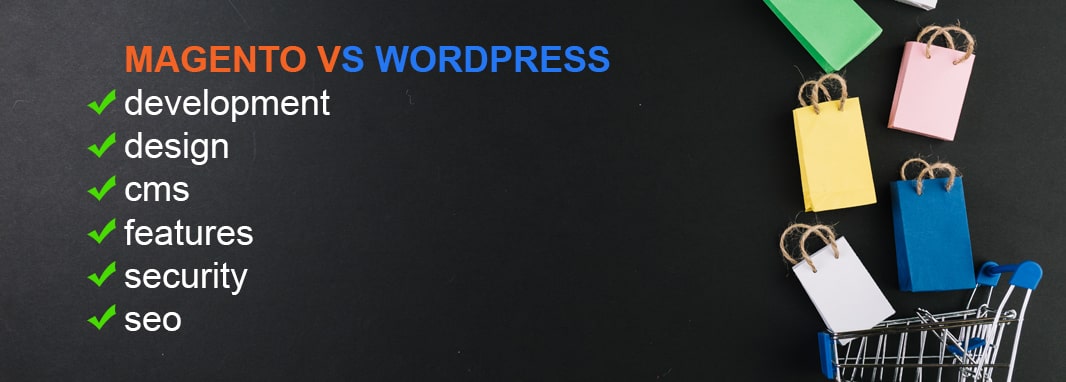If you've been wondering about which is better when it comes to WordPress vs Magento, you've come to the right place. As specialist WordPress and Magento developers, we know everything there is to know about WordPress vs Magento, whether we're talking about putting them to use to create an ecommerce store or whether we're talking about the various available plugins.
As with many important business decisions, the choice between Magento and WordPress comes down to what you're aiming to achieve with your site. Today, we're going to take a closer look at Magento vs WordPress with the goal of helping you to figure out which is the best option for you in your given circumstances.
What is Magento?
Magento is one of the world's most popular ecommerce software providers, with estimates suggesting that Magento powers 28% of all websites and 16% of the million most popular sites. One of the reasons for choosing Magento vs any other operating system is that it's easy to operate, and you can have your Magento store up and running very fast.
Magento and WordPress both offer up their software on an open-source license, which means that anyone can modify the core Magento software to create custom plugins, themes, and functionality. This means that if you want your Magento store to be different from everything else on the market, you'll be able to work with a developer to make your Magento website look and feel exactly how you want.
Do you need to build an ecommerce store, update or make a new extension? We can help!
One of the main reasons that people choose Magento vs WordPress is that it's specifically designed to power ecommerce websites as opposed to being a more comprehensive content management system (CMS). Because of this, it's much easier to create Magento stores than it is to take a WordPress build and to use plugins and other modification tools to turn a regular WordPress site into an ecommerce site.
To dive deeper into this topic read our article What is Magento?
What is WordPress?
As we've already established, WordPress and Magento have a lot in common. Let's start with the open-source model, which means that WordPress plugins and themes are available entirely for free. However, if you're trying to build something that resembles the Magento stores that you know and love, WordPress is unlikely to get the job done for you.
That's not to say that WordPress is useless – in fact, far from it. It's just that WordPress and Magento are designed with different jobs and purpose in mind. WordPress is a solid choice if you're building a content site, but for ecommerce, there's no competition between Magento and WordPress. Sure, you'll be able to find a plugin or two that will help you to emulate a Magento website, but it's not the same as just building a Magento site.
Still, for purely content-based sites, or for those which focus primarily on content and which offer up ecommerce functionality as a secondary element, WordPress can help. WordPress also has the advantage of being more immediately recognizable and arguably a little easier to use than Magento for new users. Still, both are easy to pick up, and there's not much to separate Magento and WordPress when it comes to the learning curve when you first get started.
What are your website goals?

One of the most important factors that goes into your Magento vs WordPress decision is the way you're going to use the website. Knowing your site's goals will make the WordPress vs Magento decision much simpler because each of the two systems is designed with a different type of goal in mind.
If you're looking to build a world-beating ecommerce store, Magento is by far the better option. Even without using any plugins, it comes out on top because it allows you to process secure ecommerce transactions and to cover everything from inventory management to managing product categories and carrying out marketing activity.
But when it comes to Magento vs WordPress for content sites and even just generic corporate websites, WordPress is usually the best. Thanks to its open-source model, there's no shortage of themes and plugins that you can pick up for free, but it's also common for developers to specialize in building new themes and plugins for WordPress sites on behalf of their corporate customers.
What is the difference between WordPress and Magento?

It is like asking "what's the difference between Facebook and Amazon"? It's hard to know where to start because their entire business models are so different. With that said, when you're comparing WordPress vs Magento, there's a particular set of core features that you have to talk about. Here's what you need to know when it comes to WordPress vs. Magento.
Development
Both Magento and WordPress development are highly specialized fields, which means that you'll find it pretty easy to find a Magento development company or to track down a WordPress specialist who can build you the WordPress/Magento hybrid of your dreams.
One important thing to note about Magento and WordPress – and indeed about any other ecommerce or content management platform – is that there are two different types of development. Let's use WordPress as an example. Front-end WordPress developers focus on the specific look and feel of the site, while back-end WordPress developers focus on the way the website interacts with its database.
With an ecommerce site, a front-end Magento developer would work on the look and feel of the website while the back-end developer would ensure that it integrates with the database and is correctly tracking and processing sales. Be warned that you may need both front-end and back-end developers to make your ecommerce site a success.
Design
One thing that Magento and WordPress have in common is that the design is all-important. If you get it wrong, you risk hampering performance by reducing the number of visitors who convert into customers. When it comes to Magento vs WordPress, the two are relatively similar. In both cases, you're going to need a designer and a front-end developer working in harmony if you want to build anything that goes above and beyond a generic Magento WordPress installation.
WordPress and Magento design can quickly become expensive (if you go far beyond the template), which is why many people turn to plugins and pre-existing themes and templates. This can cut costs down significantly while providing additional functionality for your Magento or WordPress website. Just bear in mind that some themes and plugins come at a premium, and so you'll have to pay to add them to your Magento and WordPress sites. Still, support is often thrown in, and it's much more affordable than developing them on your own.
CMS
Content management software (CMSs) is designed to make it easier for website owners to manage their Magento and WordPress sites. WordPress and Magento are both CMSs, and this means that you can easily add pages and products to your content or ecommerce site without having to code every single webpage manually.
Your CMS is the bridge between the front-end look and feel of your website and the back-end database. You can typically add new products, pages, categories, posts, and other types of content, and the CMS will update the database on your behalf without you needing to familiarise yourself with MySQL and other database software.
Magento and WordPress are both pretty good picks for an entry-level CMS, mostly because they're easier to use than most competing ecommerce and CMS software. Part of this is because WordPress and Magento both use open-source models, which means that there's an insane amount of documentation out there on everything from plugins and themes to the core functionality.
When we're comparing Magento vs WordPress in terms of the top CMS solution, WordPress is probably the easiest one to go with, especially for newbies. With that said, Magento and WordPress are designed with two different use cases in mind. If you're building a content site, WordPress is easier. If you're building an ecommerce site, you'd be crazy to go for WordPress vs. using Magento or some other specialist software.
Features
Magento and WordPress are both equipped with a decent range of features as a default, and if you're missing on something, you can pick a plugin to do the job for you. With that said, while Magento and WordPress do have some overlapping functionality, they also both have many unique features.
That's why it's so important to research Magento vs WordPress before you decide on which one to go for. Magento comes with all of the features you need to build a fully-fledged ecommerce site, including category and product pages, order tracking and inventory management. It will also allow you to build out the content around your ecommerce store, although you'll have less control than you would if you were using WordPress.
WordPress, meanwhile, provides a variety of content management tools that allow you to create categories, tags, pages, posts, embedded image galleries, embed Instagram feed on WordPress, and more. The downside is that you'll need to install a plugin if you want a Magento WordPress hybrid, and you'll still end up sacrificing functionality. That's why when it comes to Magento vs WordPress, you're better off with WordPress for a content site but Magento for ecommerce sites or hybrid ecommerce/content sites.
Security
Security is vital when you're building an ecommerce site as you're responsible for storing your visitors' private information. Magento goes out of its way to install security features. With that said, Magento sites are also a more tempting target because it processes and stores financial data, which is of higher value to scammers, hackers, and other malicious third-parties.
The truth is that because Magento and WordPress are both open-source, and because it's common for site owners to add third-party plugins to their Magento WordPress builds, both WordPress and Magento can have security weaknesses. That's one of the reasons why it's so important to ensure that your Magento WordPress sites are running the latest versions of the software.
You can also augment both WordPress and Magento by installing security plugins or working with developers who specialize in secure builds. This is particularly important for high-trafficked Magento stores or WordPress, and Magento builds in regulated industries such as finance or healthcare.
SEO
Both Magento and WordPress are built with SEO in mind, at least at a basic level. With that said, the first thing you should do with a new Magento WordPress build is to install some SEO plugins like Yoast, which is available for both WordPress and Magento. It's not that the core Magento WordPress functionality is bad – it's just that it's relatively basic. You can augment it if SEO is an integral part of your marketing strategy.
For example, if you're running a large scale WordPress site, then it may be useful to install a redirect plugin to set up 301 and 302 redirects to stop visitors (and search engine crawlers) from landing on error 404 pages. If you're running a large Magento store with both product pages and content pages, you may want to use plugins to add links between the two or to gain more granular control over the alt tags and file names for your product descriptions.
Conclusion
Ultimately, when it comes to Magento vs WordPress, there's no easy answer as to which of the two is the best because they set out to do two different things. That's like asking whether it's better to write with a pen and paper vs using voice to text software. Both have advantages and disadvantages and should be used in different situations.
Still, as a general rule, the choice of Magento vs WordPress is made much easier once you identify the site's purpose. If it's a content-only website, go with WordPress. If it's an ecommerce store or a hybrid content/ecommerce site, Magento is usually the better option. Just make sure that you think about it in advance because once you've made that decision, it's often hard to switch back.
The good news is that if you're still agonizing over Magento vs WordPress, help is at hand. Here at Zfort Group, we have plenty of experience of building with both Magento and WordPress, and we'd be more than happy to help you to make your content or ecommerce website a reality. By the way check out more about Magento pricing to know what you need to count on. Get in touch with us to find out more!
Do you need to build an ecommerce store, update or make a new extension? We can help!





